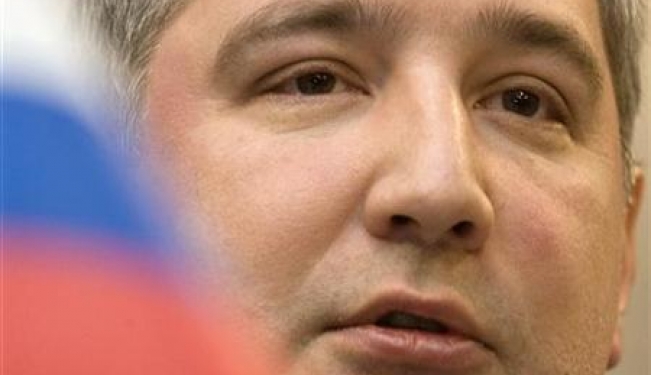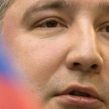
Russia’s Former Permanent Representative to NATO Appointed As Deputy Prime Minister
Publication: Eurasia Daily Monitor Volume: 9 Issue: 13
By:

In late December 2011, when Russian politicians and the public were preparing to spend almost two weeks off duty celebrating the New Year, President Dmitry Medvedev appointed the flamboyant anti-Western nationalist politician Dmitry Rogozin, as Deputy Prime Minister in charge of the defense industry and defense spending. For almost four years, Rogozin, 48, was the permanent representative to NATO in Brussels. Rogozin replaced Prime Minister Vladimir Putin’s close cohort and former KGB general Sergei Ivanov, who was moved from the government to become the chief of the presidential administration in anticipation of Putin returning to the Kremlin after the elections in March (Interfax, December 23, 2011).
Since last September, it was rumored in Moscow that Rogozin would soon return from Brussels to end his political exile and become involved in domestic politics (Kommersant, September 8). While still occupying the post in Brussels, Rogozin joined a public committee of Medvedev’s supporters and prepared a report outlining plans to reform Russia’s struggling defense industry (Interfax, December 16). Rogozin was considered a possible new defense minister, replacing Anatoliy Serdyukov, who has served in the post since February 2007. Finally, Rogozin left Brussels, while a top NATO official told Jamestown that many at NATO headquarters were glad to see the flamboyant demagogue go home at last. As a farewell gesture Rogozin planted two poplar trees in front of his Brussels residence. In Russian, the poplar tree is “Topol” – the name of Russia’s nuclear Intercontinental Ballistic Missiles (ICBM) SS-25 and SS-27. Rogozin told reporters the trees will remind NATO of the Russian megaton ICBMs aimed at the West (https://top.rbc.ru/politics/17/01/2012/633665.shtml).
In December 2003, Rogozin was elected to the State Duma as the leader of the nationalist Rodina party which, at the time, enjoyed Kremlin support. Later Rogozin fell out with the Kremlin, and was ousted as the party leader and became a speaker at extreme nationalist rallies. In May 2007, Rogozin co-founded a nationalist Great Russia party, which the Russian authorities refused to register or allow to participate in the Duma elections in December 2007. To make amends with the Kremlin, Rogozin agreed to go on a diplomatic mission abroad to keep out of internal Russian politics and spend his energy on harassing the West. Now Rogozin is back with a vengeance and has quickly become the most flamboyant member of the cabinet.
Ministers and officials in Putin’s government are not politicians in the Western meaning of the word, but top bureaucrats. Their future career depends on the opinion of one person – Putin, who mostly does not watch TV or use the Internet. Unlike Western cabinet ministers, their Russian counterparts do their best to stay out of the public eye and try to avoid journalists with the vigor of US military personnel. In contrast, Rogozin has been constantly meeting the press, running a micro blog on Twitter and providing a stream of quotes about how he is going to fight corruption and waste in defense procurement. Rogozin has disclosed that the nuclear strategic ballistic missile submarine, the Delta 4 class Yekaterinburg, gutted by fire while undergoing repairs in dry dock at a military shipyard near Murmansk last month, may return to service in 2014 (RIA Novosti, January 12).
In the present Russian government, only Rogozin and Putin are openly politically active. Putin is of course running for president and after the election may scale down his present personal PR efforts. Rogozin is not running for any post, and his PR activities, highly unusual for a top Russian official, are aimed at building a public image for the future. Rogozin seems to have far-reaching political ambitions, which Putin may find dangerous or inappropriate.
At present, Putin needs Rogozin with his nationalistic anti-Western reputation to help muster as much nationalist votes in the March 4 election as possible. Nationalists have been taking part in large anti-Putin demonstrations in Moscow, and one of Putin’s most vocal critics – anti-corruption campaigner and top blogger Alexei Navalny – is known to have connections with nationalistic organizations. It is not clear what appeal Rogozin still has within the nationalistically-minded Russian electorate, but at least until the March elections his position seems to be secure. Rogozin has kept up his traditional anti-Western stance. He publicly agreed this week that the Russian Mars space probe Phobos-Grunt may have been disabled after launch on November 9 by US military radar emissions from a Marshall Islands installation. Russian officials are prepared to run an “experiment” in a laboratory in Moscow by exposing electronic equipment similar to the one that may have failed on Phobos-Grunt, to increasingly severe electronic emissions “similar to that the US radar could of caused.” If American guilt is established, according to Rogozin, Moscow will “take appropriate political and organizational action – I’ll see to that.” US officials maintain the Russian accusations are groundless (Kommersant, January 18).
It is clear, Putin will be running his re-election campaign on an increasingly belligerent xenophobic anti-Western foundation and Rogozin fits in very well. But he still is an outsider to the Putin clan, an ambitious politician in his own right that will never be fully trusted. Putin did not give Rogozin the defense ministry – a critical position that allows him to give orders and move troops. Rogozin, as a deputy prime minister, will have a small personal staff: he will be calling meetings to “coordinate” the defense ministry, Roskosmos and defense industry corporations, but any serious decisions will be made only by Putin himself. Rogozin announced that Putin has approved his plans for the coming several months: “I will first assess the situation in the defense industry by traveling to different industrial plants and organizing meetings with the defense ministry and other militarized government agencies to understand their needs. After that I will propose a plan to reorganize the defense industry.” Rogozin envisages growing resistance, but believes Putin and Medvedev have given him a clear hand to stamp out defense industry corruption (Interfax, January 16). The presidential election must be over when Rogozin moves from assessment to action. If his defense reform plans indeed meet with serious resistance linked to influential Putin clan members, Rogozin may be marginalized within Putin’s Byzantine power structure.




